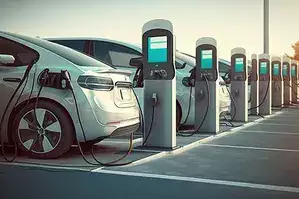 Experts indicate that the revised policy could draw OEMs beyond the current 2W and 3W segments, as infrastructure expands and public acceptance increases.
Experts indicate that the revised policy could draw OEMs beyond the current 2W and 3W segments, as infrastructure expands and public acceptance increases. Within a month of its implementation on November 18 this year, the state govt's electric vehicle (EV) policy showed an immediate impact on the sector, forecasting an upward trajectory for 2025. While the state needs a strong EV policy to keep vehicular pollution in check, the govt's announcement has also led to calls for improving infrastructure such as charging stations for better results.
The policy, which entails 100% waiver of road taxes and registration charges, has resulted in significant increase in EV sales. During the period from November 18 to December 18, Telangana recorded registrations of 1,008 electric cars, compared to 345 registrations in the corresponding period of the previous year, marking a threefold rise.
The swing in numbers is also evident in other segments, with three-wheeler registrations increasing from 30 to 138, and those of two-wheelers from 1,800 to 3,704 during the same period. Should this pattern continue, the state is expected to add 60,000 new EVs, bringing the total to 2.3 lakh.
This would establish Telangana amongst the top five states in EV registrations, following UP, Maharashtra, Karnataka and Tamil Nadu in 2025. Currently, Telangana hosts 1.7 lakh EVs, comprising 1.3 lakh bikes and 12,765 cars.
Charging up infra
"Considering the current growth rate of electric vehicles, we expect a massive surge in EV registrations in 2025, and the industry shows promising potential in reducing pollution levels," said a senior official in Regional Transport Authority (RTA). "However, there is a pressing need to establish additional charging stations across Hyderabad, particularly along the ORR and highways, to meet the increasing demand and instil confidence amongst potential buyers regarding the EV infrastructure."
Telangana's EV adoption had been modest over the past four years. The earlier 2020-30 EV policy provided complete exemption from road tax and registration fees for only the first 8,000 cars, resulting in decreased registrations subsequently. The recent announcement of similar exemptions on cars without any limit is expected to boost sales, offering savings up to INR 9 lakh per unit depending on the vehicle, thereby attracting potential buyers.
On the other hand, there are some challenges, particularly the insufficient number of charging stations. At present, there are around 700 EV charging stations in the state.
Need for price monitoring
Additionally, authorities need to prevent unethical behaviour where electric vehicle manufacturers or dealers might artificially raise ex-showroom prices to capitalise on the incentives, and not pass on the benefits to customers. It is also crucial to set up a monitoring authority to oversee and examine EV pricing patterns before and after implementing the tax waiver to identify any unreasonable price increases.
Experts indicate that the revised policy could draw Original Equipment Manufacturers (OEMs) beyond the current two-wheeler and three-wheeler segments, as infrastructure expands and public acceptance increases. The initiative aligns with supportive policies and improved battery technology, making EVs more accessible.
N Venu Gopal Rao, an independent EV ecosystem consultant, said: "The year 2025 appears promising for Telangana's EV sector. Established manufacturers of two-wheelers and three-wheelers can expand their range by introducing new models with localised components and technology. This enables traditional OEMs to convert their existing models to electric versions, expanding their offerings while maintaining brand name."
Additionally, the government is encouraging fleet operators such as auto rickshaws and taxi services to transition to EVs and special incentives are being offered to them. The policy's impact extends beyond private vehicles. The TSRTC plans to introduce 500 electric buses in 2025 which will be operated in Hyderabad.
